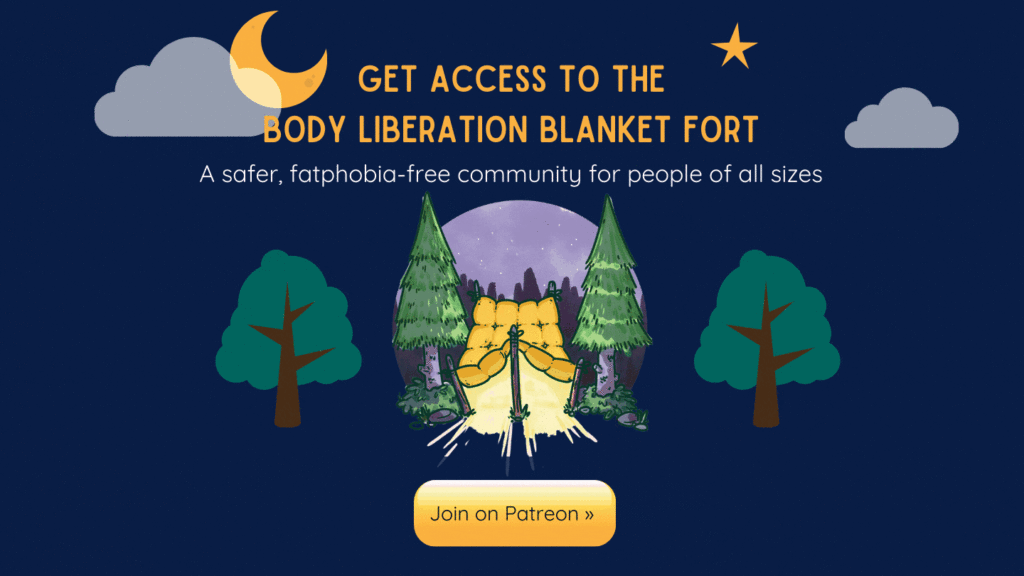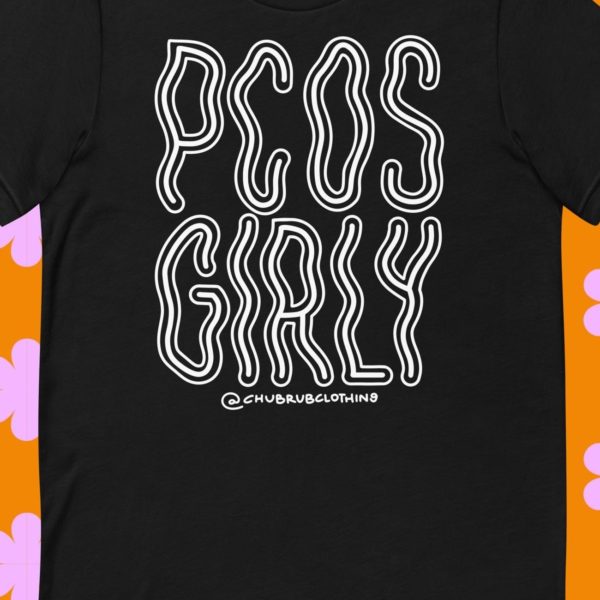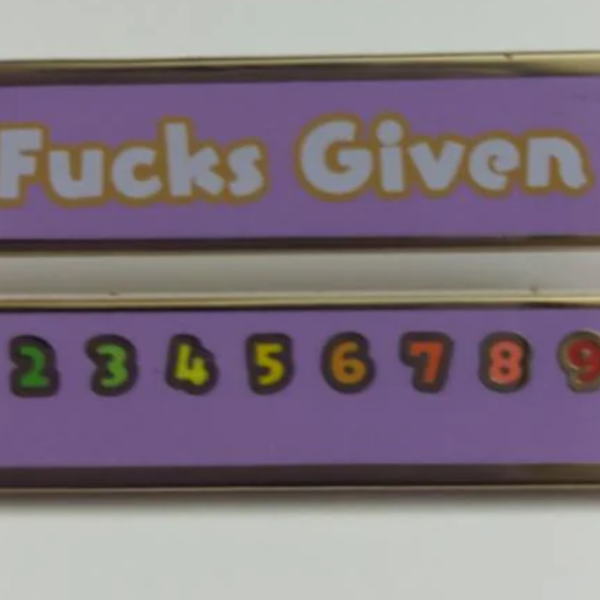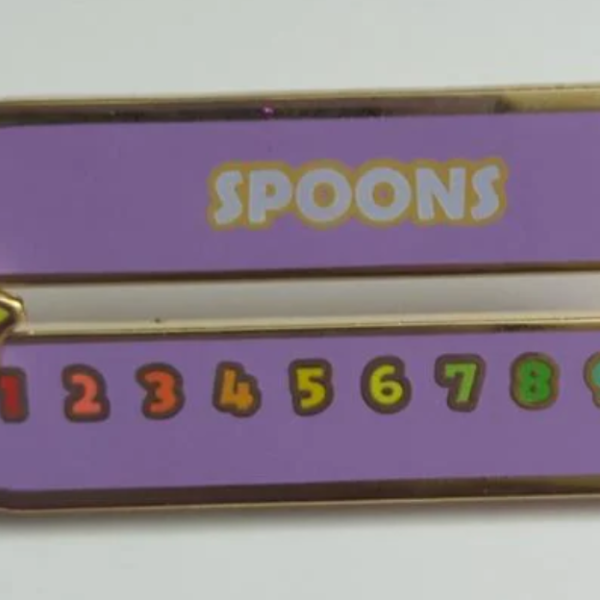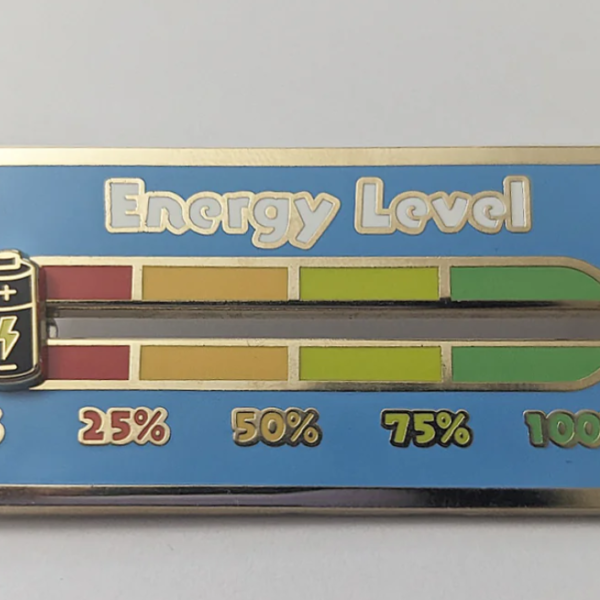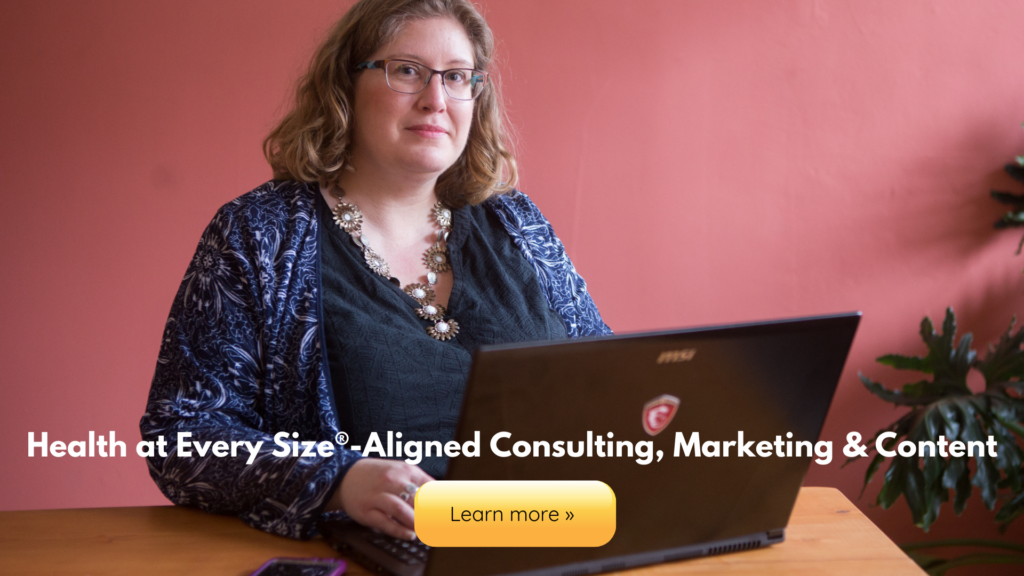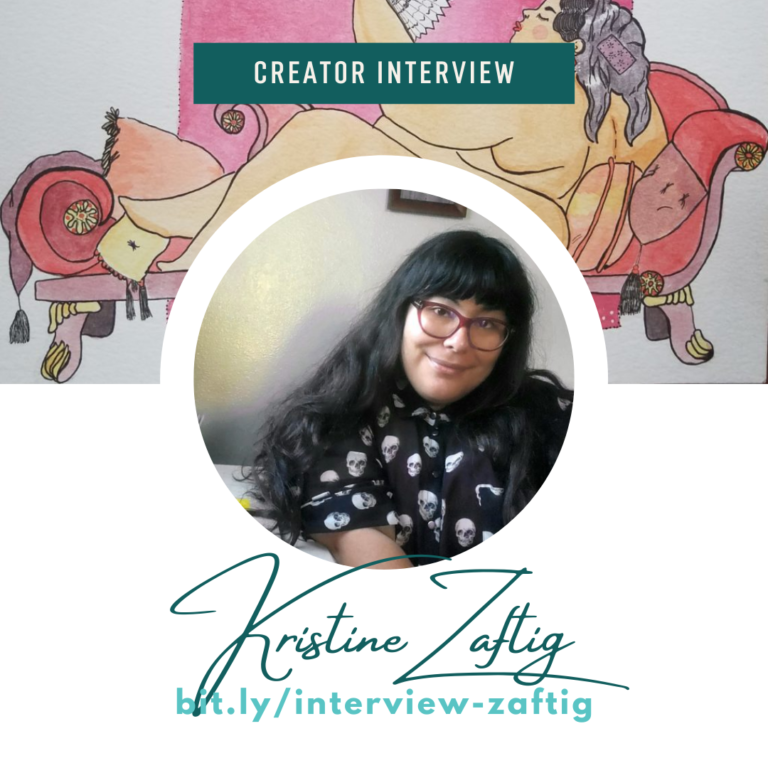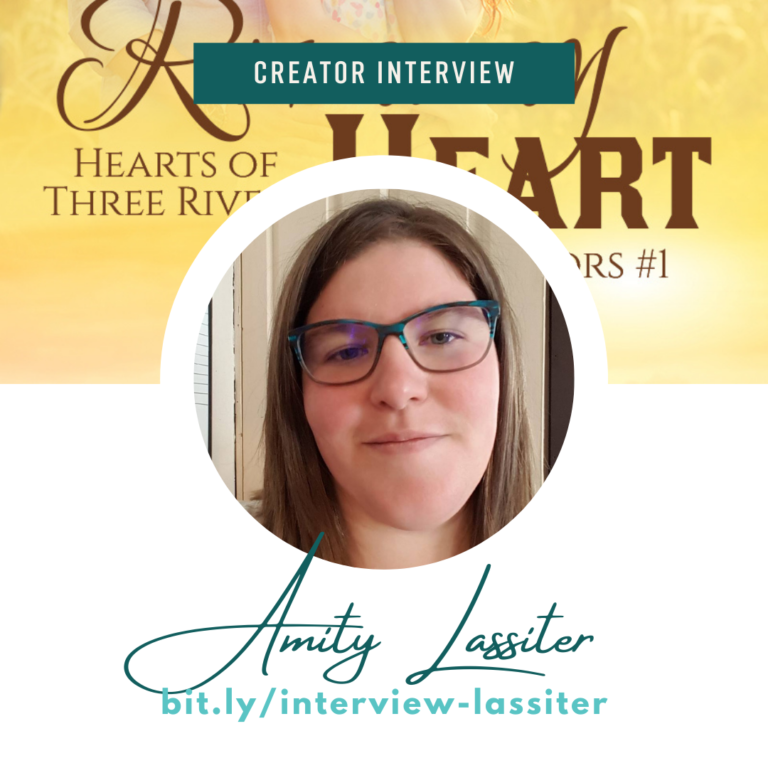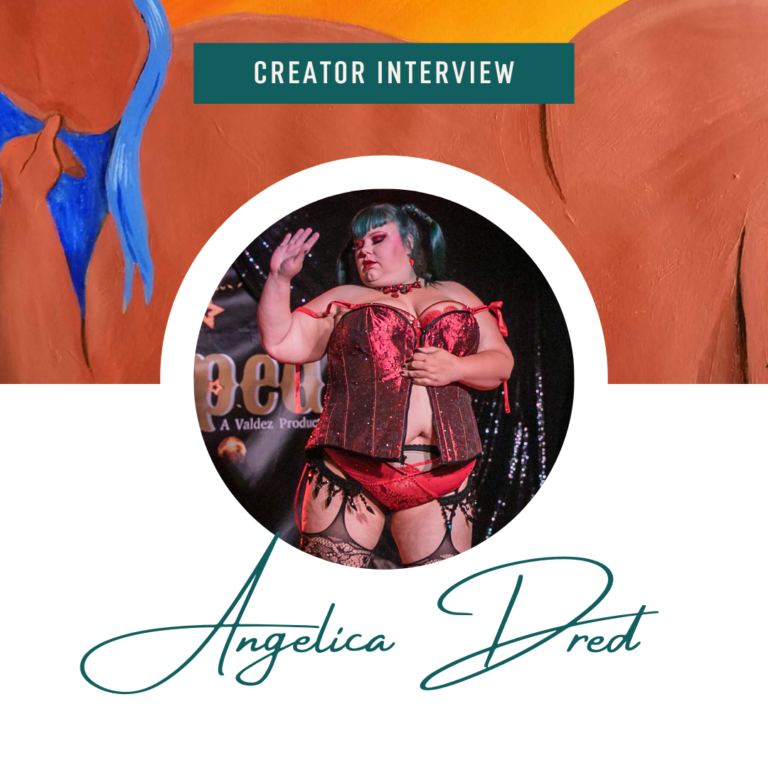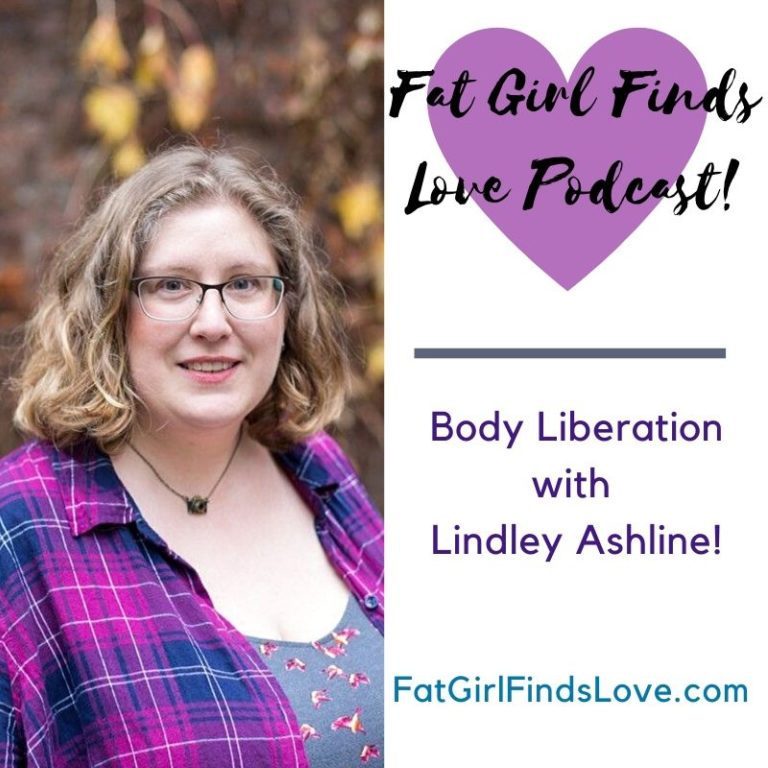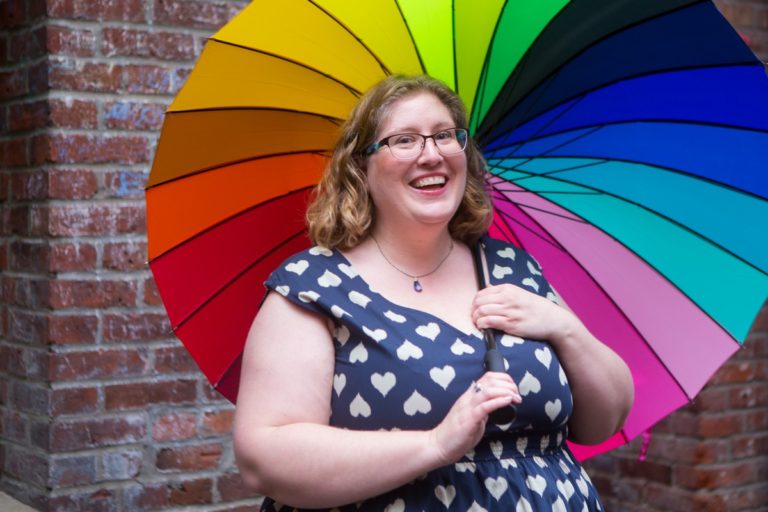Bad Fatty Podcast Episode 1: What the hell is Donut Lake?
“
This is Bad Fatty with Laura Burns and Lindley Ashline. We’re two rad fatties chatting about the world we live in and how to change it.
In this episode, we’re talking about the difference between a good fatty and a bad fatty, body positivity versus body liberation, and Donut Lake and Liberation Lake. Listen to the podcast (above) or Youtube video (below), or check out the transcript below.
Content notes: This episode contains some discussion of intentional weight loss, healthism, ableism and eating disorders.
Edited by Adam Lupiani – @QuotidianAdam
◇─◇──« About Laura »──◇─◇
Laura Burns (she/her) is a Body Liberation Guide who helps folks heal from body-shame and oppression so they can empower themselves to live the life they deserve. She is committed to helping all people honor their bodies as they are, and believes that we are all worthy and deserving of respect regardless of size, ability, age, gender expression, ethnicity, and experience with trauma. Accessibility, trauma-sensitivity, and body-autonomy are her guiding principles.
Laura offers live and recorded yoga classes online as well as community-focused personal healing and growth retreats around the world. Her book, Big and Bold: Yoga for the Plus Size Woman is available everywhere books are sold. You can find more information about classes, events, and retreats on her website – http://radicalbodylove.com and on Instagram @radicalbodylove.
◇─◇──« About Lindley »──◇─◇
Lindley Ashline creates photographs that celebrate the unique beauty of bodies that fall outside conventional “beauty” standards. She fights weight stigma by giving fat people a safe place to explore how their bodies look on camera and by increasing the representation of fat bodies in photography, advertising, fine art and the world at large.
Lindley is also the creator of Body Liberation Stock (body-positive stock images for commercial use) and the Body Love Shop (a curated resource for body-friendly products and artwork). Find Lindley’s work and get her free weekly Body Liberation Guide at http://bit.ly/bodyliberationguide.
New at Body Liberation Stock
Episode Transcript
00:00:21:09 – 00:00:46:08
Lindley A.
This is Bad Fatty with Laura Burns and Lindley Ashline we’re two rad fatties chatting about the world we live in and how to change it. In this episode, we’re talking about the difference between a good fatty and a bad fatty, body positivity versus body liberation, and donut lake and liberation lake. You should be aware that this episode contains some discussion of intentional weight loss, healthism, ableism and eating disorders.
00:00:55:11 – 00:01:25:13
Laura B.
Let’s do it. So this is our first time. Welcome. Welcome to our new podcast, Bad Fatty where we talk about whatever we want to talk about. Hi. My name is Laura Burns. I use she/her pronouns. I live in Houston, Texas, and I am a yoga teacher. I lead retreats, I do trainings, I care about fat people, and my whole jam is body liberation, fat liberation and this my friend, Lindley.
00:01:26:07 – 00:01:55:01
Lindley A.
I am Lindley. You probably already know both of us if you have run across this, but we’re introducing ourselves anyway. As you can tell, we’re super serious and organized around here. But I’m Lindley, she/her pronouns. I’m a photographer and fat activist. I have my fingers in a lot of pies. I do stock photography, client photography like portraits, boudoir, small business I do health in every size, consulting, a writer.
00:01:55:21 – 00:02:15:00
Lindley A.
Lots of different things because my attention span is very short. And so so it’s fun to be involved in lots of different things. But I am outside Seattle, Washington. I live on unceded Duwamish land, and you can always support the Duwamish Tribe at RealRentDuwamish and yeah, that’s me.
00:02:15:01 – 00:02:37:16
Laura B.
That is amazing. So many things that you do. I was literally picturing you with fingers in pies when you said so. I was laughing and I don’t want to hear any more slander about not being organized. I’ve got two. Well, one in a quarter post-it notes for the agenda for today. So I’m proudly showing on screen. If you’re watching a video, you get to see that.
00:02:37:16 – 00:02:41:20
Laura B.
So listen–hair flip–I’m very organized.
00:02:42:17 – 00:02:52:12
Lindley A.
Well, I forgot to write down all the ideas that we have for this episode. And so I am unorganized today and I’m completely winging it, which is not normal for me.
00:02:52:12 – 00:03:15:20
Laura B.
We’re both completely winging it. Welcome to the disorganized Winging It Showcase. It is the Bad Fatty a podcast and just know this is the first one we don’t know we’re doing. We’ve never done podcast before other than being guests on them, but we have a lot of things we always talk about when we get together. And I just kept going, O M G, I wish people could be in the room when we have these conversations.
00:03:15:20 – 00:03:42:00
Laura B.
So here we are. So we’re going to we’re going to get into it. We’re going to start to have this conversation. So in the future, you know, like we’ll talk about whatever you want to talk about. If you make it through this and you decide that you want to hear more from us, let us know and yeah, we’re open to suggestion, but we did decide we want to start things out with a little segment that perhaps could use a better name.
00:03:42:00 – 00:03:49:05
Laura B.
But basically it’s going to be like a thumbs down, thumbs up. What did you call it, Lindley? That I thought was not the name that I wanted to hear.
00:03:50:11 – 00:03:57:00
Lindley A.
I called it Cheers And Jeers because I am a creature that apparently arrived from the 1980s today.
00:03:57:20 – 00:04:06:02
Laura B.
I kind of love it and kind of hate it, but so we’re going to go thumbs up, thumbs down and do you want to go first?
00:04:06:18 – 00:04:28:02
Lindley A.
Sure. My thumbs up is that my hair actually looks really good today. And it has absolutely no right to do so. But I’ve discovered that since I started bleaching and dyeing my hair, it changed the texture so that so that I can stick it up in a ponytail now and just pull it down right before a meeting and it magically looks good.
00:04:28:15 – 00:04:41:17
Lindley A.
And I have no idea why this works. I’m going to I’m going to credit it with like white lady good Becky hair. Oh, but but I’m really enjoying the fact that it looks like I actually put some effort into it without actually having to do so.
00:04:42:12 – 00:04:55:23
Laura B.
We don’t question the good fortune when those things happen. Before this, everyone, I was complaining nonstop about my bangs looking jacked up today they’re looking OK right now. It’s been a situation all day. What’s your thumbs down?
00:04:56:13 – 00:05:15:15
Lindley A.
My thumbs down is that I am really craving a Butterfinger mini right now because of the video game that I play. I had a promo a while back where if you bought a bag of these little miniature Butterfinger bars and they’re not they’re not like the fun size, these would be the actual bite size things is what they were promoting.
00:05:15:20 – 00:05:17:10
Laura B.
Oh, the right. They’re not.
00:05:18:00 – 00:05:21:24
Lindley A.
And I cannot find them anymore. So they got me hooked on them, and now I can’t find them.
00:05:22:02 – 00:05:46:24
Laura B.
I don’t think they make them anymore. But you see my movie theater candy of choice. OK, so good. This is not my thumbs up, but I do just want to give like a shout out to the fact that we showed up like matching today, like, not on purpose. I showed Lindley earlier, if you’re watching the the video you can see I’m holding on my leg in a really delightful position and my leggings match Lindley’s sweater, which is like a teal.
00:05:47:02 – 00:05:57:00
Laura B.
We’re both wearing pink and teal it was not on purpose. But I am a person who loves to twin, so I just need to acknowledge that we look great together right now.
00:05:57:00 – 00:05:57:08
Lindley A.
We have a vibe.
00:05:58:02 – 00:06:32:17
Laura B.
My thumbs up is the, like, energetic, emotional high that I’m still riding. Coming out of the Fat Magic retreat that I just hosted last week with none other than the amazing @fiercefatfemme, Angelina Moles. It was, I think, the best retreat I’ve ever hosted. It was just like a confluence of, like, greatness. The people who came there, they showed up, like, ready to be open and vulnerable and have fun and also grow there was like some real honestly, like, transformational shit.
00:06:33:22 – 00:06:52:02
Laura B.
And then, like me and Angelina, who had never hosted anything before together, we’re a great team it was just perfect. And so I’m still feeling, like, really amazing that my thumbs down, I can think of literally nothing. I mean, there’s a lot of things in this world that I would like to thumbs down, and I could vent about that for a long time.
00:06:52:08 – 00:07:15:19
Laura B.
But I my number one today is going to be how fucking hot it is here in Houston. Good God, it’s 3:41. Let’s check the temperature again. 96, 96 degrees. And we’ve not hit the hottest part of the day. And also super humid so there you go. I’m going to try really hard if we continue doing this podcast, not have my thumbs down, just always be how hot it is.
00:07:17:04 – 00:07:41:04
Laura B.
Really hating the heat is like my entire personality. So that’s who we are. That’s what we’re liking, what we’re not liking right now. And I think it’s time to, like, really get into it. And so we thought that the most perfect topic for our first and maybe only podcast episode would be what we decided to name it. It’s called Bad Fatty or the Bad Fatty podcast.
00:07:41:04 – 00:08:00:18
Laura B.
We actually haven’t even discussed which version we’re going with whatever. So we want to talk about what the fuck is a good body or bad fatty. And then also we want to share with you a delightful metaphor that we came up with that kind of ties into this that I’ve started to say to people and they’re really into, so we’re going to let you know all about it so that you can be into it also.
00:08:02:04 – 00:08:06:21
Laura B.
So good fatty, bad fatty. Lindley, what does this mean?
00:08:07:13 – 00:08:45:15
Lindley A.
So good fatty and bad fatty is, is how we are perceived and how our actions as fat people are perceived by others. So if you are a good fatty and I want to be really clear that these are roles that we can choose to take on that affect how we’re treated and we all want to be treated well by other people, there, there are probably not too many people on the planet who seek to not be treated well in their daily lives by other people.
00:08:45:21 – 00:09:14:21
Lindley A.
And if that’s you like, you know, cool, consenting adults. But, but, but most most people in their daily lives want to be treated well. And so I want to be really clear as we talk about this, that I’m not putting judgment on individuals who choose to fall into or who fall into good fatty or bad fatty roles, because there are a lot of really valid and important reasons that we can choose to take on a role so that we–our lives aren’t
00:09:14:21 – 00:09:49:12
Lindley A.
as hard. So with that caveat, a good fatty is somebody who is actively, actively seeking to to not be fat, essentially. So this is somebody who might be performative, dieting, and performative exercising, somebody who is going out to eat and choosing the salad, not necessarily because they want the salad but because they are going to be treated better when they are seen in public eating a salad.
00:09:49:22 – 00:10:29:11
Laura B.
Yeah. You know, I’m just going to butt in here I have so many thoughts about this. So one of the reasons that I like to talk about good fatty bad fatty so much is because I I’m a bad fatty. Lindley also a bad fatty, right. I used to be the poster child of a good fatty, which is why and now I look at that and I think about the things that I said and the stuff that I did, and I’m like cringing so hard and I just want to, like, grab young Laura Burns and be like, slapping, you know, I mean, like, kindly slapping with love and compassion, but like slapping just side to side on their
00:10:29:22 – 00:10:46:15
Laura B.
little chubby cheeks and being like, shut the fuck up. You’re going to learn. Life is gonna teach you that you are wrong. And also all the things we said about, like, compassion and like, we understand why people choose to do the things that they do and engage in intentional weight loss and all those things. So, like, good for stuff.
00:10:46:15 – 00:11:08:24
Laura B.
I really get amped up about good fatty versus bad fatty stuff because I’ve been there and been that good fatty I grew up really active playing sports in dance, and I was always fat, always the fattest one in the room if there are other fat people. And so I learned along the way that I felt like I need to justify my existence and like, OK, I’m fat, but my cholesterol is perfect.
00:11:09:03 – 00:11:36:18
Laura B.
Oh, you should. I literally, you know, you should see my lab results. And I would say these things. I would say I would tell people the numbers on those reports because I felt like that’s what I had to do to be treated less like garbage. As a fat person. And so when I say like I understand, like the the motivation behind engaging in these behaviors, I get it like absolutely but I also now see how that’s really damaging and harmful both for you and for the rest of us in the world.
00:11:38:05 – 00:11:57:08
Laura B.
It’s a really complicated thing, you know, good fatty, bad fatty, gets kind of boiled down and like oversimplified and it becomes like a glib thing that we say, and I’m super guilty of this. It is so much more nuanced and complex than what we usually dive into, but I’m excited to talk about it today and like actually kind of get into some of that.
00:11:58:00 – 00:12:18:00
Lindley A.
Yeah. Yeah, because because being the bad fatty is, is being somebody who is unapologetic about living in a fat body who who is not dieting for weight loss and who is not, which is different from managing a medical condition, to be clear, but who is not trying to.
00:12:18:20 – 00:12:20:12
Laura B.
Justify their existence.
00:12:20:13 – 00:13:11:09
Lindley A.
Yeah, not trying to and not trying to gain the approval of people who who harbor bias against fat folks and this is. Yeah, like Laura said, this is such a nuanced conversation because it’s more than about… I find a useful analogy to be wearing makeup because wearing makeup is a lot more complex than just I’m going to choose whether or not to wear makeup today because there are ramifications in how I am perceived, how I am treated by others, the roles that I’m taking on, both from a a a beauty standard standpoint and a gender standpoint and a a performing femininity and all these different these different things.
00:13:11:09 – 00:13:47:08
Lindley A.
And those have real ramifications. But at the same time, we can’t boil that down to, oh, well, you shouldn’t wear makeup because you’re a bad feminist if you wear makeup because because it’s just way more nuanced than that. And so so being a good fatty or a bad fatty is really really nuanced. And there are some times when even if we are bad fatties, when we might choose to take on an aspect of a good fatty temporarily for self-preservation, I might choose to say, I’m…
00:13:47:08 – 00:14:04:21
Lindley A.
I used to work for a company that was and the office that I worked in was on the fifth floor. And there was a guy that I worked with who every time we went out to an external meeting, he would he would like lead us all back up the stairs, for five flights. And was I capable of doing so?
00:14:04:21 – 00:14:31:11
Lindley A.
Yes. Was I going to be incredibly out of breath at the top? Yes. But at the time, it was a matter of self-preservation to disguise that because I didn’t want to be the only person who was [deep breaths] panting because I was also the only fat person. And now in hindsight, I’m betting a lot of other people were very carefully disguising their breathing, too.
00:14:31:15 – 00:14:52:10
Laura B.
That’s it. I was just going to say, you don’t have to be a fat person to be out of breath like a lot of people might be out of breath after climbing five sets of stairs and like the gymnastics that we have to do to like get out of that situation or to disguise our breathing. And this breathing thing is a big one for me because I have like come from like the backpacking world and like the hiking world and stuff.
00:14:52:11 – 00:15:08:23
Laura B.
It’s a huge thing there with like fat people and hiking and stuff. But yeah, like, oh my God. And of course, you know, that guy was just like, of course we’ll take the stairs, you know, like, that’s good, that’s good. Get those extra steps and, you know, like, whatever, like not thinking at all about anyone else’s experience there.
00:15:09:07 – 00:15:24:06
Laura B.
I guess like the bad fatty, like, reaction would be like to take the stairs and be out of breath or to say, I don’t want to take the stairs because I don’t feel like it or I don’t want to be out of breath or I don’t want to get sweaty. I’ll take the elevator. So what did you do instead?
00:15:24:06 – 00:15:26:07
Laura B.
What was your action?
00:15:26:14 – 00:15:50:07
Lindley A.
Oh, I just I went up the stairs with everybody else and I disguised my breathing. And this was also this was about ten years ago to before I had as strong of a fat politik as I have now. And before I had this was when I was really starting to discover fat activism as opposed to like Outfit of the Day.
00:15:50:11 – 00:16:00:04
Lindley A.
What would have been more body positivity then? Although it was it was shortly before body positivity became a thing but but this was really when the time when I was discovering that deeper work.
00:16:01:02 – 00:16:22:11
Laura B.
Oh, I’ve pretended to be injured before, so I didn’t have to walk up stairs with people I had pretended to be pregnant before so that I could sit the fuck down in a situation where other people were standing. I pretended to be pregnant when I was finishing my college degree and I had not been in the classroom. I taken a big break from college.
00:16:22:11 – 00:16:42:03
Laura B.
I finally went back. It’s like I got like one semester left and I had gained a lot of weight since I had been in college previously. And I was taking this online class really to show up a few times. But there were I literally didn’t fit in those horrible desks with the like attached the chair desk combo. Like I literally didn’t fit in there in the seat.
00:16:42:03 – 00:16:57:09
Laura B.
Like with the desk, it’s like jammed into my belly so I told them that I was pregnant and that’s why I didn’t fit or whatever because I didn’t want to get into it. And it was embarrassing. And this was a long time ago and and so I was like, yeah, I need to just like get like a different, just like a chair.
00:16:57:09 – 00:17:24:06
Laura B.
And I’m just like hold the notebook or whatever. And like, these are these are the choices that we make, like, and think about like the that maybe whoever’s listening us has never really had to make that decision before. Imagine, like, how that feels to do that, you know, like, that feels like it feels really bad to feel like I had to pretend to be pregnant or that I was injured or, you know, like, you have to disguise your breath going up the stairs,
00:17:24:06 – 00:17:26:07
Lindley A.
which is also hard,
00:17:26:07 – 00:17:28:08
Laura B.
which is also really, really hard.
00:17:29:00 – 00:17:50:00
Laura B.
It’s like a tax on us, you know, it’s like this extra layer of shit that we have to deal with if we’re choosing not to be seen, to be invisible, to take up space, to be loud, like all those things, you know, like this is the tradeoff. So in that moment, maybe I felt like more respected, more like dignity as a human being, but the tradeoff is, you know, X, Y, or Z.
00:17:50:10 – 00:18:13:06
Laura B.
And so like when we say we understand when people choose like be a quote, good. I’m doing a lot of air quotes to be like a quote “Good Fatty” I get it. I understand why people choose intentional weight loss. I get it because they want to access privilege. They want to not be treated like a garbage person. They want to be like have any modicum of respect and dignity as a human being.
00:18:13:14 – 00:18:34:24
Laura B.
And even losing a small amount of weight, people treat you differently. It happens so quickly. So I get it. I completely understand. That’s why that’s one of the reasons why this is such a nuanced conversation. Do I agree with intentional weight loss? No, I don’t. Do I understand why people choose to do that? Yes. Do I agree with weight loss surgery?
00:18:35:03 – 00:19:02:21
Laura B.
No. I don’t think it’s a good thing. I personally have lost friends because they died after getting it, especially in the beginning when they didn’t have the VSG. I think it’s called the sleeve when it was like legit gastric bypass, like all of that, literally her friends who died. But I also have friends who died after getting VSG and people like don’t realize that’s like a thing that still happens anyway.
00:19:03:03 – 00:19:21:24
Laura B.
So like I am not going to change my opinion on that. But I also understand why some people choose to do it for the access for any amount of privilege. And then also think about like what other layers of marginalization or oppression are happening with that person. If you’re listening to this, like, I really try not to be judgmental about those things.
00:19:21:24 – 00:19:35:05
Laura B.
I know what I believe and what I would want for myself. I know what I would want for other people, but I also don’t know what it’s like to be in your shoes, you know? I don’t know what it feels like to do that. And if I believe in body autonomy, I feel like I say this so often.
00:19:35:16 – 00:19:53:00
Laura B.
I believe in body autonomy, and I get to do what I want with my body. Then you do too. Right? Then it’s not my place to have an opinion or to judge or to say you’re doing the wrong thing. And yeah, and sometimes it’s hard, but, you know, like, if that’s what we believe in, that people get to own their bodies, they get to do what they want, then we have to.
00:19:53:07 – 00:19:54:09
Laura B.
hold that to be true?
00:19:54:23 – 00:20:10:11
Lindley A.
Yeah. Yeah. And, and as activists. Well, I’m not going to speak for both of us, but I know something that gets thrown at me a lot is “you don’t want people to be able to choose for themselves.” And yeah, of course I do. But I want people to have options.
00:20:10:15 – 00:20:11:21
Laura B.
A real option.
00:20:11:21 – 00:20:12:16
Lindley A.
Yeah.
00:20:12:16 – 00:20:33:13
Laura B.
Not like, I feel like I have no options, so I’m going to try to lose weight or I’m going to whatever, you know, and it’s not always like being a good fatty It’s not always about weight loss. But it’s also like we haven’t kind of mentioned this, but like another part of being a good fatty is about the pursuit of health and the performance of the pursuit of health.
00:20:33:18 – 00:20:55:14
Laura B.
Right. Which are two different things. So like when I was a good fatty, I I was very much pursuing like the mainstream definition of health. I had some stuff going on with my body, but it’s like very able bodied, like not a ton of health things, but like a little bit. And over time and this is what I hear from so many people is like over time, it’s like, oh, chronic illness, number one.
00:20:55:17 – 00:21:27:20
Laura B.
OK, oh, maybe it only takes one. Maybe it takes more. It took more than one chronic illness for me to change the way I was thinking. I was really indoctrinated in diet culture, and even after I was like letting go of diet culture, I was really indoctrinated in like good fattiness But so like three chronic illnesses later and like really starting to see how healthism and ableism show up in my life and how it impacts me and my how I’m treated and how I view other people, how I perceive even myself.
00:21:27:21 – 00:21:49:21
Laura B.
In the past, I perceive other people really just starting to see how we are doing ourselves and the world a disservice when we are pursuing this one definition of health, when we are pursuing something that may not ever be available. I am. I understand now. I will never be healthy in the way that the world would want me to be healthy.
00:21:49:21 – 00:22:20:14
Laura B.
Which number one is usually you start with a small body, which right small body doesn’t equal health, but in in mainstream society, it does, right? It’s like I would never be able to be healthy in the way that they want. I have three chronic illnesses. I’m a fat person. I got a lot of stuff going on with my body and like continuing to chase that hurts, hurts me physically and emotionally, and it hurts our community when we’re all chasing this thing that we cannot achieve and we never get to arrive at the place where we think we’re supposed to go.
00:22:20:14 – 00:22:40:05
Laura B.
And like mentally that is a mind fuck you know? And so for me, that was a big thing. Is like realizing that what I was chasing was not possible. And so if that’s true, if I’m building, if I’m basing my self-worth off of this thing, that I’m chasing that I can never achieve, that means I will never be worthy.
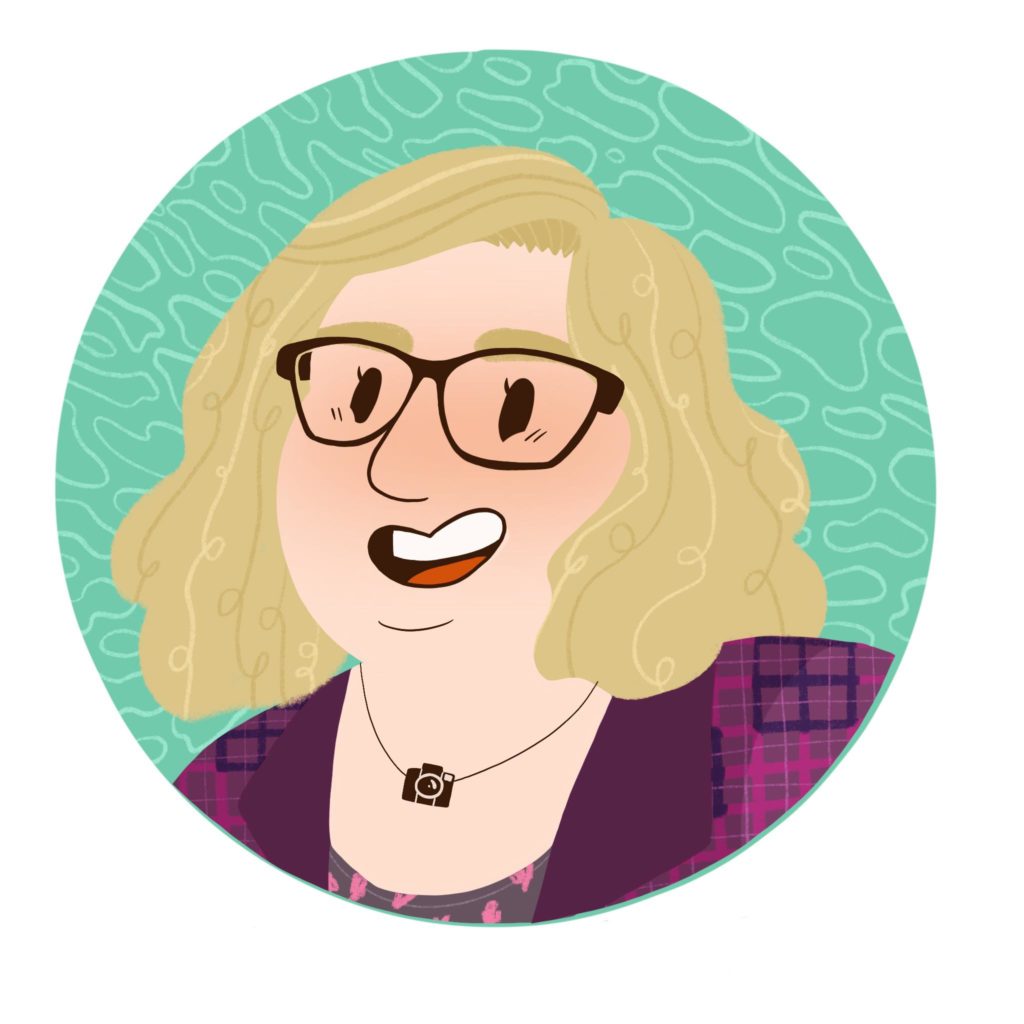
Every Monday, I send out my Body Liberation Guide, a thoughtful email jam-packed with resources on body liberation, weight stigma, body image and more. And it’s free. Let’s change the world together.
00:22:40:17 – 00:22:47:21
Laura B.
And I don’t want to live like that. I want to be able to be worthy. So, OK, I got to shift what I’m thinking what do you think about that?
00:22:48:11 – 00:23:20:10
Lindley A.
Yeah, this I think the concept of worth runs through all this because something that we haven’t touched on yet that I think ties right into this is the concept of Worth paired with the concept of Trying because the reactions that we get when we are performative dieting and we’re choosing the salad and we’re we’re at the office and we’re only eating half a slice of pizza or a quarter of a bagel, well, at least we’re trying.
00:23:20:15 – 00:23:28:08
Lindley A.
And you can see this in every Internet comment section that has anything to do with fatness, too. Well, they should be trying to lose weight.
00:23:28:08 – 00:23:39:03
Laura B.
So you gave up if you’re not trying, you’ve given up, right? You’re making the choice to just be fat and unhealthy. And we owe it to the world to be trying.
00:23:39:19 – 00:24:16:02
Lindley A.
Right. And so so you are treated so much better. Let me tell you how many doctors I’ve lied to when they have when they have said, oh, are you getting X movement per week? I’m a housecat, unlike Laura. I don’t I don’t do movement unless it’s for a purpose. Oh, I mean, and obviously that purpose can also be it makes you feel good or there’s joy in it or whatever but but like and I do take one of Laura’s yoga classes every week that I that I don’t have a conflict, but because it has a purpose for me.
00:24:16:17 – 00:24:40:20
Lindley A.
But I don’t I don’t seem to get endorphins from exercise. I don’t I don’t know. But it does that mean that I never move? No, of course not. But I don’t do what we would think of as like fitness type exercise. And, and so and so every doctor ever, they cannot resist no matter how good they are or think they are about fat folks, they cannot resist.
00:24:41:05 – 00:25:08:04
Lindley A.
Well, are you, are you at least getting in some movement? And I will tell them yes, no matter what the actual situation at that moment is, because the perception that I am trying and yes, for that moment, I’ve turned into a good fatty because the perception that I am trying gives me better access to health care. Which is which is if I’m interacting with the doctor, that’s what I need at that moment.
00:25:08:17 – 00:25:28:24
Laura B.
And also as a person who does get movement in. And so I can honestly say, yes, I’m getting that amount of movement and it’s never enough because then they go, oh, well, you should do X number of minutes more or miles more or this or more frequency or whatever. It’s never enough. Lindley. it doesn’t even matter if it’s a lie or not because it’s never enough.
00:25:28:24 – 00:25:43:20
Laura B.
Because they look at your fat body and they decide that they know everything. How many times have we been I’m going to speak for you in this moment because I’m going to know that this I already know the story. How many times have you been to the doctor? And they don’t even ask, what are you eating? Right? They just assume that they know what you’re eating.
00:25:44:06 – 00:26:08:16
Laura B.
This is like a universal I have met, I don’t know one person, two people in my life who are like, yeah, that never happens. And they’re in a fat body. It happens to all, like, pretty much all of us. There’s just assumptions made. And even so, even when I was in good fatty-dom I would answer those questions if they deigned to ask where I was eating, or I would just tell them.
00:26:09:08 – 00:26:37:01
Laura B.
And it was like, you know, very quote, I’m doing air quotes, “very healthy.” Right. A lot of vegetables. Well, I was a vegan. I was a vegetarian. I was a raw vegan– that was, yikes. As a person with IBS, being a raw vegan And it’s not the move, let me just say. But even when I was like super restrictive in my eating disorder and I was like trying to be a good fatty, it was still never enough being you know, the most restrictive, like super clean eating, like orthorexia situation.
00:26:37:01 – 00:27:19:08
Laura B.
It was not enough. It’s never enough because your body is still fat. It’s not enough until your body is small by any means possible. And that’s the thing is like being good fatty means reaching for that whatever that goal of fitness or of health and general of eating, of whatever by any means possible. Because a good fatty is potentially hurting themselves to be like that, you know, and that’s what we mean when we say bad fatty is like, I am no longer willing to hurt myself to strive for the definition of health or whatever that somebody else set, right?
00:27:19:08 – 00:27:39:13
Laura B.
Like so being a bad fatty is saying, here’s my definition of health, which might be not being healthy, right? So like when I got to decide, OK, my definition of health is not anywhere near with the mainstream definition of health, as my definition of health is not pursuing treatment for my IBS because it’s literally traumatic emotionally and physically for my body.
00:27:39:18 – 00:28:04:00
Laura B.
Instead, my definition of health is mitigating symptoms on the daily basis because now I can leave my house now I’m not like anxious and upset and being put into situations that are really harmful for me in many ways. Right? That’s my definition of health. Right? Is like harm reduction in that case. And that’s a really hard concept for people to swallow.
00:28:05:04 – 00:28:22:12
Lindley A.
And outside of health, being a bad fatty might look like not accepting poor treatment based on your size. It might look like speaking up. Oh, nothing nothing gets you labeled a bad fatty faster than speaking up about poor treatment based on size discrimination.
00:28:22:17 – 00:28:23:10
Laura B.
Yeah. They don’t like that.
00:28:25:03 – 00:28:36:15
Lindley A.
Yeah. And and it might look like it might look like wearing clothes that you actually like that aren’t it’s my time for the air quotes that aren’t “flattering.”
00:28:36:15 – 00:28:56:05
Laura B.
Oh my God. Flattering, fucking flattering. It’s one of my least favorite words. Yeah. I’m so glad you bring up clothes stuff because like within like the realm of clothing, you know, when I was a good fatty, it was like, well, it was also like, the early 2000. So it was like, you put a belt on everything you got to do. You still have to emphasize your waist right?
00:28:56:10 – 00:29:17:13
Laura B.
You may be fat, but you can emphasize the smallest part, right? A belt. Those of you who were not like of age or whatever in the early 2000s. Let me just tell you, you missed out on a phase where literally everyone put a belt over fucking every outfit. You put on a dress, you put on a cardigan. Oh, you better put a belt over that on top of all the things, right?
00:29:17:13 – 00:29:43:10
Laura B.
It’s like, what? Oh, my God. So yeah, like choosing to not try to make your body into an hourglass. It’s not a fucking hourglass that’s a bad fatty choosing to wear comfortable shoes instead of heels, choosing not to wear shapewear, choosing to wear clothing, silhouettes that are shapeless, right or, like, really flowy and don’t emphasize any part of the body that’s being a bad fatty letting your belly outline be visible, right?
00:29:43:10 – 00:30:06:00
Laura B.
VBO That’s when VBO kind of started to pick up speed as, like, a thing. Having a haircut that makes you happy, having short hair or having bangs when you’re fat. I’ve had people refuse to give me bangs, even though it’s like I’ve had things before. I really like bangs. Here are photos of me with bangs I like. It would not give me bangs because I have a quote “round face” I actually don’t have a round.
00:30:06:00 – 00:30:37:19
Laura B.
Like my face shape isn’t actually round. I’m just fat not wanting to cut short hair. I used to always have a pixie cut. Oh, it’s more flattering to have longer hair because you can kind of disguise your double chin. “Disguise?” Like having longer hair that covers my double chin from the side is not going to like mitigate. Like, I’m backing up so that if you’re watching the video you can see my bad, like, it’s not going to make me thin all of a sudden that I have hair, like wearing color, wearing patterns, like all of this stuff.
00:30:38:07 – 00:30:57:00
Laura B.
It’s like ingrained into us. It’s like it’s bad. You don’t want to be visible, you don’t want to be seen, you don’t want to stick out. You don’t want to be loud. All of this stuff, right? So being a good fatty is like adhering to all these rules. Oh, I feel like I’m yelling. I get so, like, what about this stuff.
00:30:57:12 – 00:31:29:20
Lindley A.
Yeah, and I just I just keep coming back to, like, good fatty bad fatty when it comes to boundaries and the kinds of treatment that we will or won’t accept to beyond– Not that I was going to say just the physical aspects. And of course, the physical aspects aren’t just anything the really important, but it’s also it’s also no longer tolerating, say, if your family is mean to you about your body or gives you lectures about your body or your about being sorry.
00:31:30:06 – 00:31:31:19
Laura B.
Is that or about what you’re eating?
00:31:31:21 – 00:31:52:02
Lindley A.
Yeah, you’re eating choices. Your, your, your, your food choices anything about yourself or your body. The setting boundaries around that is a really good way to be perceived as a bad fatty, but may also be the only way you’re ever going to get any peace.
00:31:52:13 – 00:31:53:00
Laura B.
Mom.
00:31:53:15 – 00:32:22:02
Lindley A.
So, so maybe you’re treating you’re treating the temporary discomfort of having to set a boundary and being perceived because the way that we’re perceived it can affect our mental health even when it’s not even when it’s not direct. I’m not sure much sense it makes. But when I, I grew up southern in the southern United States and sometimes you can hear it in my accent sometimes you can’t.
00:32:22:09 – 00:32:51:15
Lindley A.
But even though I live, I live in the Pacific Northwest now. But things, things there, there’s a lot of things that are implied a lot of passive aggressiveness, a lot of social context. And so so I can only speak from my own experience here but when I know that I am being perceived a specific way, it affects how how I am being treated by other people.
00:32:51:15 – 00:33:16:02
Lindley A.
But it also that culture is meant for that to take a toll on you. And so so you might be when you’re setting a boundary around your body, you might be taking that on in exchange for not having constant aggression at you and just knowing that that is the way that you’re going to be perceived and being OK with that or maybe it’s a decision you’re making from moment to moment.
00:33:16:10 – 00:33:25:05
Lindley A.
Maybe you’re willing to set a boundary around this, but it’s it’s less aggro in your life if you don’t set a boundary around that. You know, it’s always this constant negotiation.
00:33:25:11 – 00:33:57:04
Laura B.
You’re like weighing your options. It’s like, OK, I’m going to be making people uncomfortable. Which then causes microaggressions or overt aggression. It’s like, what am I comfortable with making people feel uncomfortable about? Maybe uncomfortable you know, about clothing, but I’m not comfortable food. Maybe I’m comfortable with setting boundaries about health stuff, but not comfortable about like like fertility or, you know, like something like, yeah, it could be like a constant negotiation and it’s it’s like self-preservation in this moment.
00:33:57:04 – 00:34:13:14
Laura B.
What can I handle? Reinforcing right? Because, like, all of this stuff is like constantly tested and tested and tested. So, like, there are some people in my life that I have, like, this set of boundaries with. And there are some people in my life that have a lot more boundaries because I know that it is easier to hold them because they don’t test me as much.
00:34:13:14 – 00:34:33:23
Laura B.
Right. And so it’s like harm reduction. What can I what can I handle from which people and how am I do in the world? Is this constant negotiation in our heads? It’s like so exhausting. Like this is another tool on our bodies is that we have to think about this whole set of shit that other people don’t have to think about.
00:34:34:08 – 00:34:40:12
Laura B.
And you and I have privileges that a lot of people don’t you know, and they have to think about even more shit.
00:34:41:03 – 00:34:41:12
Lindley A.
Yeah.
00:34:41:22 – 00:35:00:21
Laura B.
And now that it’s like oppression, Olympics, but like recognizing the privilege that you have is really important I want to go back to something that you said earlier when you were talking about body positivity. Let’s just like kind of briefly maybe go through body positive versus body liberation versus fat liberation. And then I want to talk about our two lakes
00:35:00:24 – 00:35:01:15
Lindley A.
Yeah. Let’s do it.
00:35:01:15 – 00:35:28:05
Laura B.
Let’s define the differences between these things. So disclaimer the definition of these terms like changes because of popular culture. When body positivity came on the scene, it was first being developed like a really long time ago. It was more radical, it was different, it was much more like fact centered and disability centered the way that it kind of emerged into the world on Instagram is a little different.
00:35:28:05 – 00:35:49:10
Laura B.
So we’re going to be talking, I think, about the way that it exists now in the year 2022 on social media and and in the world usually, oh God, this is where we get into capitalism co-opted by capitalism, to sell us things that make us feel like shit about ourselves. I’m looking at you dove with your deodorant that makes underarms more attractive.
00:35:49:16 – 00:36:08:02
Laura B.
I will never shut up about that. It is infuriating. So if you are a person who knows the history of like body positivity and fat liberation, you know what I’m talking about? We’re not talking about that. It’s too much. That’s a whole episode in and of itself. We’re just talking about what body positivity has come to mean now.
00:36:08:19 – 00:36:34:20
Laura B.
And that is kind of like a rah rah, love your body kind of like imagine like a thin influencer, like hunching over to make rolls and saying like, Oh, aren’t I brave for like daring to have like a skin, a skin roll? But it’s not even fat, you know, like this kind of thing. It’s like straight size people kind of inventing body issues for themselves.
New in the Body Love Shop
00:36:34:20 – 00:36:52:20
Laura B.
Oh, this is going to listen. Fuck. OK, thin people can absolutely have body image issues for sure. Thin people have eating disorders than people have all kinds of stuff going on. I do not mean to belittle thin people in this, but I also don’t want to center thin people’s feelings. And if you’re feeling offended right now, please know that I’m really not trying to.
00:36:53:10 – 00:37:15:00
Laura B.
But I not. Everything is about that. The whole world centers thin people’s feelings. So this listen, bad fatties don’t center in people’s feelings I don’t mean that you’re like less worthy or anything. I feel like I have to have this disclaimer because people like to get mad at me. We are all worthy. Everybody has issues. I want to talk about fat people right now.
00:37:15:00 – 00:37:38:15
Laura B.
So body positivity has come to mean just like love your body. Like you just need to love your body and everything will be better and you’ll feel better about yourself and everything will be great. So that’s what I mean. And obviously there’s more nuance to it than that. But this is like a podcast for people who never make podcasts so we’re going to be like kind of low level here. Lindley do you have some to add to that definition.
00:37:39:03 – 00:38:24:21
Lindley A.
Yeah, yeah. Body positivity by its very nature, is aimed at everyone who has a human body, and obviously we we want there to be we mean me and Laura and all fat activists, we want there we want the world to exist in a way where all human bodies are able to access body care and body love, body care from an emotional standpoint, by it’s also by its very nature when we talk about all bodies, the power lies with bodies that are the closest to cultural beauty standards.
00:38:25:06 – 00:38:57:15
Lindley A.
And so, so many, many activists and many people who are in vested in these in breaking down these systems of power and these systems of oppression prefer to go with something closer to that positivity because fat positivity specifically centers bodies that are much further away from these these pop culture beauty standards. And further away from the center of power because because it resists the focus.
00:38:57:15 – 00:39:20:11
Lindley A.
Just being pulled right back to this is this is why Laura and I are doing this podcast episode, because I also immediately thought of Dove in that co-opting of of something that was original like created by and centered on fat people and just immediately said, how can we use this to sell thin people things essentially.
00:39:21:01 – 00:39:31:12
Laura B.
OK, so just to keep like these definitions, separate body positivity, say three words that come to your mind when you think of body positivity.
00:39:32:13 – 00:39:36:00
Lindley A.
Love shallow midsize.
00:39:36:23 – 00:40:06:15
Laura B.
OK, yeah. I also thought the word shallow. So I’ll pick something else. I’m going to say surface. I’m going to say Oh, what is the word? I want to just say capitalism. I’m just going to say capitalism and I’m going to say white those that I don’t know if that helps people. I had a real flippant thing Lindley went into like some nice articulate shit, but these three words from each of us, I feel like it’s a good idea.
00:40:06:21 – 00:40:28:02
Laura B.
We’re going like not a deep dove here. So then body liberation, right? So to me, body liberation is like the the ideology or whatever that people move to once body positive kind of stop being about centering the most marginalized. And so they’re like, well, I don’t want this. And like, literally, this is me I don’t want to say body positive anymore because that doesn’t feel right.
00:40:28:02 – 00:40:47:14
Laura B.
It doesn’t feel good to me. So I’m going to start saying body liberation, because to me this is like a little different because it’s not about like oh, I just want to love myself. It’s like, oh, I just want access to health care. Oh, I just want to be paid the same as a thin person. Oh, I just want to not be treated like garbage.
00:40:47:21 – 00:41:13:17
Laura B.
Right. And it’s not about like, oh, I just want to love myself. I just want my body image to improve and like, you know, like I make everything a joke is not. So to me, body liberation was like the move. And then in my opinion, it kind of has also started to become like what happened to body positive in that like the the smaller that’s the mid what people are calling mid-size now.
00:41:13:24 – 00:41:50:21
Laura B.
And the thin folks kind of came in and they were like, yeah, body liberation, which like, listen. Yeah. Body liberation for everyone. Absolutely. But like, stop pushing out the most marginalized folks in order for you to have your body liberation moment. I we all deserve it. We all I want all of us to have it. And also what happens is that the most marginalized people get pushed out of the movement and the things that started to help them, to help them organize and connect and make change become about the least marginalized, marginalized people.
00:41:51:08 – 00:41:56:04
Laura B.
Do you does that feel like body liberation like kind of in a very small nutshell.
00:41:56:13 – 00:42:05:03
Lindley A.
Yes. And for me, the difference between positivity and liberation has been about the difference between individuals versus system.
00:42:05:03 – 00:42:06:13
Laura B.
Yes.
00:42:06:13 – 00:42:23:24
Lindley A.
And so so inherently like positivity is centered in how I feel about my body, how I stick up for my body, whatever, how I choose to dress my body, what products I choose to buy for my body, to bring it back to capitalism.
00:42:24:18 – 00:42:53:21
Lindley A.
And inherently liberation is or should be about breaking down the systems that made me not love my body in the first place, the systems that supported white supremacy and white beauty standards in the first place. The when I pulled in my my thumbs up earlier, when I talked about my hair looking good, I said that that was about you know, white Becky with the good hair that the white beauty standard.
00:42:54:22 – 00:43:15:07
Lindley A.
And and it pleases me today that my hair happens to be closer to that standard than it might otherwise be. But that’s a white beauty standard. And if you can’t if you can’t see the video, which we will be posting probably on YouTube somewhere, but if you can’t see this, I’m gesturing really hard right now. But so so liberation should be about these systems.
00:43:15:22 – 00:43:34:23
Lindley A.
And and in some ways it’s even more of a even more of a problem when then that becomes co-opted. And so so there are folks in the activism community now that are moving away from body liberation as a term because it is also being co-opted.
00:43:35:10 – 00:44:03:15
Laura B.
Yeah, exactly. Yes. I’m like raising the roof vigorously nodding. Yes, yes, yes. OK, so fat liberation is if, if, if that is true about body positivity. If that is true about body liberation, then fat liberation then is the next move towards still trying to get our fucking space to to advocate for what we’re looking for. So to me, fat liberation is about fat community.
00:44:03:15 – 00:44:20:08
Laura B.
It’s about collective care. It’s about it’s not about body image. Like I do. I want everyone to love their body. Yes. Do I think it’s possible to love your body all the time? No, because we live within the world that we live within and that is constantly teaching us like X, Y and Z right. That’s a whole other conversation.
00:44:20:16 – 00:44:47:10
Laura B.
But to me, fat liberation is like, let’s center the fattest of the fat. Let’s center people with multiple intersections of marginalization. Let’s listen to let’s allow them to speak. Let’s let them be seen and heard and take up space and all the things right like the people who keep getting pushed out. Like, I imagine like a little timeline, you know, people who, like, get pushed out of body positivity that get pushed out of body liberation.
00:44:47:10 – 00:45:03:12
Laura B.
Like, I want them to be like [huffs] I’m putting my hands on my hips and like doing like a power stance. Like I want them to stand in all their power. I want their voices to be heard. And in some cases, I am part of that group. And in a lot of cases I’m not because I got a lot of privilege.
00:45:03:12 – 00:45:31:24
Laura B.
I got lots of going on. You know, that makes it easier for me to exist in the world I also have stuff that is not that is not a privilege. And so, like, we can exist in different ways within these communities, like within fat liberation. Sometimes I’m loud and sometimes I shut the fuck up, right? Sometimes I’m at the front in my power stance and sometimes I’m like in the back, like, you know, supporting from below or, you know, like lifting people up or providing whatever.
00:45:31:24 – 00:45:49:04
Laura B.
I don’t know what kind of metaphor I’m trying to make here, but like I’m at the bottom of the cheerleading pyramid sometimes and sometimes I’m towards the top. But what I recognize is that we have different positions to be in within that liberation. It is for people, it is for fat people. It is about fat people and it is by fat people.
00:45:49:14 – 00:46:13:17
Laura B.
And also we need smaller fats and we need straight size people to be what everybody likes allies, whatever. I don’t know. I have a complicated relationship with that word, but like we need everyone else to be on board, but we need you at the bottom of that cheerleading pyramid. You know, like we need you doing the things that you can do in your life that also don’t take away from the space that fat folks are taking up.
00:46:14:24 – 00:46:31:14
Laura B.
You have like, you know, all the layers of marginalization. So what do I mean by that? I mean like you’re a small fat or a midsize or your straight size person and you’re at work and somebody makes a fat joke. You need to be the person to be like, hey, that’s not funny. And here’s why every time, not like once.
00:46:31:14 – 00:46:53:11
Laura B.
And then you, like, pat yourself on the back. And I’m not trying to be a bitch, honestly. I’m just saying, like, this is a shit that we really need. And people are always like, How can I be an ally? I’m like, This is how every time somebody says something fat phobic, say something. Every time somebody says something racist or homophobic or transphobic or ableist or classist or healthist, it’s like all these things say something.
00:46:53:11 – 00:47:04:05
Laura B.
Because unfortunately, number one, people need that reinforce a lot of times before their own opinions start to change. And secondly, it’s going to mean more coming from you. And that sucks.
00:47:05:00 – 00:47:25:22
Lindley A.
I agree. And I also feel like this seques beautifully into into the concept of the two lakes that we came up with a while back because like I can, I can immediately sort of feel the resistance on the listener end when smaller people hear we need you on the bottom of the cheerleading pyramid.
00:47:25:22 – 00:47:26:16
Laura B.
I know,
00:47:26:16 – 00:47:49:24
Lindley A.
because it sounds thankless, it sounds hard, and but it’s also a really fantastic analogy because if you are taking a turn at the bottom of the pyramid and you live in a more privileged body from whatever aspect and like Laura was saying, we all have we all have aspects where we’re more privileged and less.
00:47:51:06 – 00:48:13:03
Lindley A.
But but there’s a good chance that maybe this is your first turn at the bottom of the pyramid, or maybe it’s your fifth. But it’s also likely that the person that you’re supporting might not ever have had a chance at the top level. And so so yeah, it’s hard, thankless work to be at the bottom. And it does mean.
00:48:14:08 – 00:48:16:04
Laura B.
It’s like absolutely necessary.
00:48:16:06 – 00:48:39:07
Lindley A.
Yeah, but, but, and it also means that the people, the people around you have probably always been on the bottom. And so if, if this is your first time and you’re finding that it really sucks, think about spending your whole life there because it’s likely that you haven’t realized how many people have been supporting you over time, whether they wanted to or not.
00:48:40:04 – 00:49:02:24
Lindley A.
And I’m autistic and I am really invested all the time in the practical. And so, so I love analogies like this cheerleading thing is really working for me. But then also like where does that what does that look like? And that’s a whole different discussion. Maybe we’ll do another episode on that, how that translates into real life.
00:49:03:09 – 00:49:05:01
Laura B.
Let us know if you want to hear that.
00:49:05:10 – 00:49:37:18
Lindley A.
So but but maybe that looks like stepping back and letting having somebody else have an opportunity. Maybe it looks like seeking out someone for an opportunity that you’ve been approached about there a million things that that that a million ways that might look but but it’s really about asking the folks who’ve always been at the top to step back and and so this the seques is so neatly with the concept of these two lakes because I did a newsletter about this a while back.
00:49:37:18 – 00:49:57:01
Lindley A.
I can’t remember if I put it on the blog or not. If if not I’ll put it there so that it’s searchable. But but the concept is is there are two lakes and one is at the bottom of a mountain and it’s called Donut Lake. And and it’s it’s sunny there. It’s warm, it’s at the bottom of the mountain.
00:49:57:01 – 00:50:05:09
Lindley A.
So it’s it’s like pleasantly summer warm without being a hundred Texas degrees. As I look at Laura.
00:50:06:00 – 00:50:07:19
Laura B.
90% humidity.
00:50:07:20 – 00:50:19:18
Lindley A.
So yeah, I know it’s nice. It feels good. The water is pleasantly cool without being cold. And there are vendors all around the lake who will sell you beach chairs.
New at Body Liberation Stock
00:50:20:14 – 00:50:25:06
Laura B.
Delicious food. There’s music pumping. It’s your favorite song. All the time.
00:50:25:15 – 00:50:59:04
Lindley A.
Yeah. And it’s just a cool, fun, awesome place to be. And it’s it’s populated by people who who tend to be in thinner, relatively thin to thin bodies. And then at the top of the mountain is Liberation Lake is at the top of the mountain. So it’s colder and the water’s colder. And maybe there are some clouds up top, but there are a whole bunch of fat people up there that are doing the work to generate the water.
00:51:00:03 – 00:51:26:07
Lindley A.
And the water flows downhill to Donut Lake and if you haven’t figured out the analogy, this is body liberation or fat liberation at the top and then it’s body positivity at the bottom and and so the people who are up top, who were who were generating this beautiful crystal clear water that flows down the mountain they’re not getting paid to do that.
00:51:26:22 – 00:52:09:09
Lindley A.
They’re not and they’re not getting there’s no vendors up there. There’s there are very few people swimming there’s nobody giving them the money for that work. They’re just up there doing that work because the water needs to be created. And so so to be really to be the bad fatty and be really blunt about this body positivity takes the work the water that that fat activists and other marginalized thought leaders and activists create you know, I want to be very clear that this is one of a large number of possible marginalizations, and it’s what we’re here to talk about.
00:52:09:15 – 00:52:12:07
Lindley A.
But it overlaps with many other things as well.
00:52:12:18 – 00:52:42:16
Laura B.
And I raise my hand because I want to say this. Not only is this like the work of like all the fat activists and just like fat people who never wanted to be an activist but ended up having to be one in order to live their life. But it’s also built on decades of the hard ass work that fat people and other marginalized folks have been doing for a long time with absolutely no recognition and who are not ever like shouted out now or very rarely are acknowledged that they have been doing this work, or that people did this work.
00:52:42:16 – 00:53:01:23
Laura B.
Like body positivity did not begin on Instagram, right? Like this, that liberation did not start with social media. And so not only are we up here at the top and slack and cold and there’s no delicious food and we had to swim upstream to get there and it sucks and there’s no music. And like we’re just working all the time and like supporting each other.
00:53:02:03 – 00:53:22:23
Laura B.
But like also there’s all these people who did that and who never got any kind of like thanks or appreciation. It’s like, honestly, like just work really hard fighting for these things to go unacknowledged. And that is a really hard life to have because like, we’re human beings and we like to be acknowledged and validated for the hard work that we do.
00:53:24:09 – 00:53:52:13
Laura B.
So, yeah, so now this beautiful, delicious body, liberating water, whatever we’re describing it as flowing down stream to this gorgeous, hot, sunny, but not too hot, delicious food, having music, pumping comfortable chairs everywhere, a situation and it’s like love your body. Oh, loving your body is so great. We love it. Yay! Awesome. And and those people don’t want to leave that lake and they’re like, oh, I see that.
00:53:52:13 – 00:54:23:18
Laura B.
Like, up there, something’s going on. But, like, that’s really hard to get to. I really don’t want to, like, swim upstream or climb this mountain I’m going to stay here because it’s really great here, right? And they never leave Donut Lake, and they just exist. They’re reaping the benefits, which, honestly, we want everyone to have the benefits. But like we need some help like if everybody stays at Donut Lake and people don’t go up to I forgot what you called it, the.
00:54:24:01 – 00:54:24:21
Lindley A.
Liberation Lake.
00:54:25:03 – 00:54:54:09
Laura B.
Liberation Lake Oh, right. Then, like, eventually the people at Liberation Lake are going to get fucking tired, right? They’re going to stop doing that work. And they’re going to realize that, like, people don’t care or they don’t care enough. Right. And this is like a very, like, brutalist view of this. And this comes from, you know, like, I’ll speak for myself, somebody who feels very often like they work very hard on these things and people steal their work, literally steal their content.
00:54:54:22 – 00:55:15:03
Laura B.
I don’t know why I’m in third person. If people steal my content and they post it as theirs, and it’s usually white folks in a smaller body and it’s like, oh, revolutionary ideas because it’s coming from them. Right? I know so many fat creators who have their work, literally like their graphics that they created their original thoughts, their ideas stolen and reposted as their own.
00:55:15:03 – 00:55:32:04
Laura B.
It happens in every like not just in movement spaces in, you know, like dietician spaces and just activism stuff. Like it happens so much. They take your work or they take your labor and they expect it for free. Like, that’s a thing that Lindley and I talk about all the time. So it’s just like there are these two lakes and people don’t want to leave the fun one.
00:55:33:00 – 00:55:54:13
Laura B.
Right? But the thing is, if more people would leave the fun one and come up to the one that is admittedly less fun, we could make it more fun. We could make it so much easier. You know, it’s like the whole like many hands make light work or whatever that phrases like if we were all doing the same thing, imagine the change that we could create and how much faster we could be creating this change.
00:55:54:19 – 00:56:20:21
Laura B.
Like if you like, body positivity and like what has happened on social media and like in the past ten years or whatever, imagine if we were all getting like more into it. Imagine if we were all pushing for like policy change for, you know, like adding the size as like a protected status or, you know, like any of the things that exist, like instead of, you know, clawing, you know, one handful of dirt at a time.
00:56:20:21 – 00:56:37:15
Laura B.
I don’t know, I’m mixing so many metaphors now, but like, you get it imagine the change that we could create if we were all actually working on creating this change instead of just enjoying Donut, lake and I fully recognize that I’m like up on a soapbox right now, but like, this is what happens when you and I hang out.
00:56:37:15 – 00:57:05:19
Laura B.
Like, it’s so disheartening sometimes, like, I don’t, I don’t mean to be a bummer, but like it’s really disheartening to feel like there’s a group of people working so hard on stuff and it’s really hard to make that progress. And then you see people in a smaller body like a white thin woman just taking that work, taking that stuff, and like building a brand on it and like finding wild success.
00:57:05:22 – 00:57:22:05
Laura B.
When you see that content that they stole from like a black woman or a disabled person or whatever, and you see that that person doesn’t have that same level of success, you know, and like how many times can you see something like that happen? You get so mad and so disheartened, you know?
00:57:22:22 – 00:57:40:23
Lindley A.
Well and well, here’s my half of the soapbox. We are all in this together. And here’s my end of it, is that once again, I want to I want to draw a really clear line between the people who are swimming around in Donut Lake, who are enjoying something that maybe they maybe they’ve never had access to a lake before.
00:57:41:07 – 00:58:08:04
Lindley A.
Maybe this is the first time they’ve ever been in one. And what kind of cool community are they finding and what kind of cool maybe they’re learning how to swim and they’ve never had a chance to do that. That’s amazing. But I want to draw a really clear line between individuals who are there as individuals and people who are building platforms, careers and and profit off of– this is my turn to get really loud– off of donut Lake.
00:58:08:23 – 00:58:25:14
Lindley A.
And this is this is companies like Dove. This is social media influencers who are body positivity influencers who are in small bodies this is clothing lines that are claiming to be inclusive when they’re not, which is a whole air quotes.
00:58:25:14 – 00:58:26:02
Laura B.
That’s a whole episode.
00:58:26:02 – 00:59:05:07
Lindley A.
That’s a whole thing. But but all these these people who are using the water that came from Liberation Lake to build their businesses and their careers and their their profit streams, they are they are taking things that don’t really belong to them. And and often, not always, but often they are not adding anything of value. It it’s just capitalizing and coming back to capitalism, capitalizing on the work that other people did and just repackaging it.
00:59:06:20 – 00:59:29:13
Lindley A.
It’s kind of, you know, it’s scooping water on the lake, pouring it into a bottle and say, and look, here’s a decorative here’s a commemorative donut lake bottle. And all they’ve done is stick it in a bottle with a price tag on it. And so, so so I want to be really clear that just like when we talk about good fatty, bad fatty, if you are someone who is following a lot of body positive influencers, we’re not yelling at you, I promise.
00:59:30:20 – 01:00:20:16
Lindley A.
But but if you are a body positive influencer who is regurgitating an often watering down, pun intended, I guess, but if you are taking this stuff and just repeating it without adding anything of your own, and without without crediting who you are learning from, without giving without pointing people to two sources that are more radical than you, without without elevating other voices, those are the folks that I get really frustrated with because those are the folks who who are keeping people in Donut Lake for their own power and profit and possibly cynically, possibly thoughtlessly using the people who are generating that water up top for their own uses.
01:00:20:16 – 01:00:25:17
Lindley A.
And that’s really crappy. That’s a crappy thing to do to other human beings. Maybe don’t do that anymore.
01:00:28:01 – 01:00:53:08
Laura B.
Maybe don’t do that anymore. Absolutely. So, yeah, so we’re not mad at you. We’re not trying to be offensive. We’re just like being real honest. We’re giving our real opinions. That’s the whole point. There’s a point in this that Fatty podcast is like I want people to hear the conversations that we have when we’re not recording, which is literally the entire point of starting this and to speak to that.
01:00:53:13 – 01:01:19:11
Laura B.
We want to know what you want to hear opinions about or what topics you would love to hear other people talk about. If you’re a fat person, let us know. So did you make it this far? Maybe. Maybe not. Maybe you’re not listening to me say this right now. If you made this far and you like this, thanks. I’m making a cute face, I’m giving a little heart to your way.
01:01:19:11 – 01:01:42:00
Laura B.
You can find us on Instagram. I am at I almost said body liberation with Lindley. I am @radicalbodylove on all the things my website is radicalbodylove.com. Come find me on Instagram, comment on literally anything or send me a dm I don’t care. Let me know that you enjoy this. Let me know any topics you have, any questions you have when you want to say yours
01:01:42:24 – 01:01:47:18
Lindley A.
I am @bodyliberationwithlindley, I don’t know why Laura is trying to steal my Instagram.
01:01:48:11 – 01:01:49:04
Laura B.
I don’t know.
01:01:50:05 – 01:02:10:14
Lindley A.
But but I’m @bodyliberationwithlindley on Instagram. I’m @lindleyashline on Twitter and my website is bodyliberationphotos.com and yeah, come find us, tell us what you want to hear opine about us. And we’ve got we’ve got some show notes to put up for you along with this. So see that and we’ll put our links there as well.
01:02:10:23 – 01:02:13:23
Lindley A.
And I hope you enjoy it and hope to see you back again.
01:02:14:11 – 01:02:34:16
Laura B.
Yeah. And like listen, if you have the kind, compassionate, constructive criticism, we’d love to hear let us know about topics, all the things that I already said I will repeat again and no. Oh, no. Thanks for listening. Thanks for being here. I think that’s it. And maybe we’ll see you next time.
01:02:35:03 – 01:02:36:02
Lindley A.
Yeah, talks soon!

Every Monday, I send out my Body Liberation Guide, a thoughtful email jam-packed with resources on body liberation, weight stigma, body image and more. And it’s free. Let’s change the world together.
Hi there! I'm Lindley. I create artwork that celebrates the unique beauty of bodies that fall outside conventional "beauty" standards at Body Liberation Photography. I'm also the creator of Body Liberation Stock and the Body Love Shop, a curated central resource for body-friendly artwork and products. Find all my work here at bodyliberationphotos.com.


![Illustrated Art Stock: Plus Size Woman Covered with Flowers [Body Liberation Stock exclusive] - Body Liberation Photos & Stock](https://bodyliberationphotos.com/wp-content/uploads/2024/09/Illustrated-Art-Stock-Plus-Size-Woman-Covered-with-Flowers-Body-Liberation-Stock-exclusive-94337-600x600.jpg)
![Illustrated Art Stock: Plus Size Woman Twirls in a Skirt [Body Liberation Stock exclusive] - Body Liberation Photos & Stock](https://bodyliberationphotos.com/wp-content/uploads/2024/09/Illustrated-Art-Stock-Plus-Size-Woman-Twirls-in-a-Skirt-Body-Liberation-Stock-exclusive-94328-600x600.jpg)
![Illustrated Art Stock: Plus Size Woman Twirls in a Skirt [Body Liberation Stock exclusive] - Body Liberation Photos & Stock](https://bodyliberationphotos.com/wp-content/uploads/2024/09/Illustrated-Art-Stock-Plus-Size-Woman-Twirls-in-a-Skirt-Body-Liberation-Stock-exclusive-94323-600x600.jpg)
![Illustrated Art Stock: Plus Size Woman with Hands Over Breasts [Body Liberation Stock exclusive] - Body Liberation Photos & Stock](https://bodyliberationphotos.com/wp-content/uploads/2024/09/Illustrated-Art-Stock-Plus-Size-Woman-with-Hands-Over-Breasts-Body-Liberation-Stock-exclusive-94318-600x600.jpg)
![Illustrated Art Stock: Plus Size Woman with Hands Over Breasts [Body Liberation Stock exclusive] - Body Liberation Photos & Stock](https://bodyliberationphotos.com/wp-content/uploads/2024/09/Illustrated-Art-Stock-Plus-Size-Woman-with-Hands-Over-Breasts-Body-Liberation-Stock-exclusive-94313-600x600.jpg)
